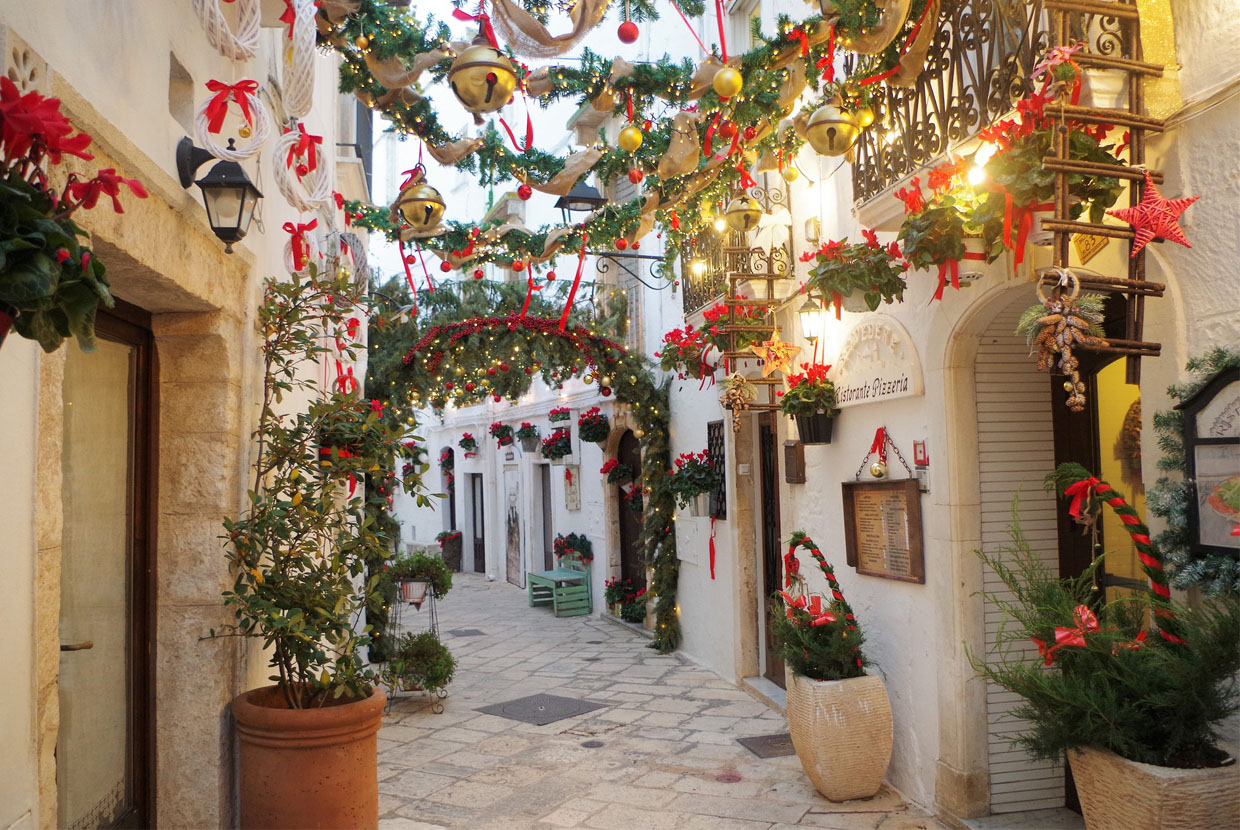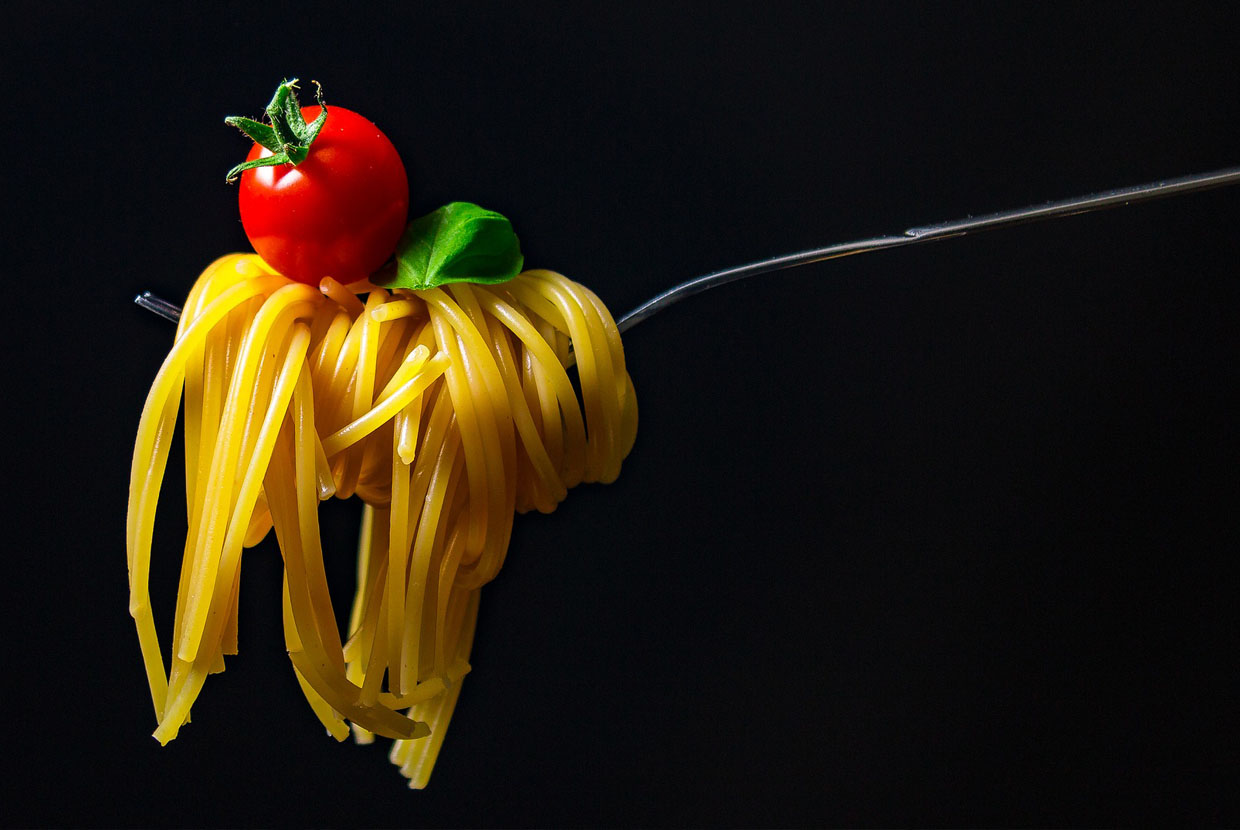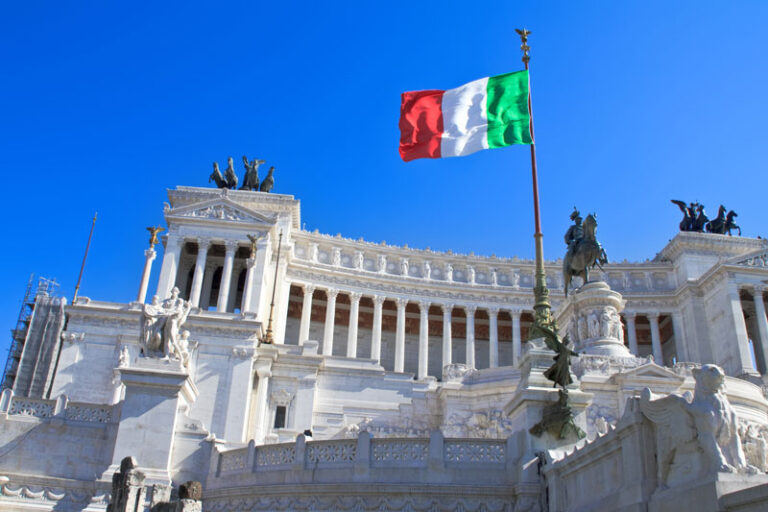Are you becoming an Italian Citizen? If so, buckle up because life in Italy has some truly wonderful Italian cultural and holiday traditions! It helps to get acquainted with them so you feel more in the loop and so you don’t accidentally upset any of your fellow Italians. Plus, Italian traditions can be fun!
Discover the many Italian traditions for family, weddings, holidays, and more!

Italian Christmas Traditions
If you love Christmas time, then Italy is the place for you. While decorating doesn’t commence until December 8th, known as the Day of the Immaculate Conception, Italians keep the Christmas season going until January 6th, the Day of the Epiphany which is also the 12th day of Christmas.
Italian Christmas traditions will vary all through the country and they’ll vary in the US too when you’re here celebrating Italian holiday traditions with your Italian family.
Italians Love Caroling
In Italy, the 8 days prior to Christmas are filled with caroling and bagpipe players, called ‘zampognari.’ This 8-day stretch is called the Novena and is a great time to brush up on your singing skills.
Nativity Displays are a Must
Called ‘presepi,’ you have to put up a traditional nativity scene. In Italy, you’ll find these ornately hand-crafted displays that are simply stunning. Even in your spouse’s Nonna’s house in the states, you’re likely to find a prominent and beautifully designed nativity scene.
Meatless Christmas Eve
In Italy, they go meatless to cleanse prior to Christmas Day. But that doesn’t exclude fish, and quite often, you may see multiple courses of foods from the sea to fill you up the night before.
Get Ready for Midnight Mass
Italians and Italian Americans often head to Midnight Mass after the Christmas Eve dinner. However, tradition does vary in each city. In northern regions of Italy, some families go skiing at midnight instead!
Arrive hungry on Christmas Day
Christmas Day is one of the best days of the year to be included in Italian family traditions. Family and friends are invited for a big lunch that will span all day. Traditional and utterly exquisite dishes await.
Celebrate Beyond That Too
You may want to postpone those workout plans on December 26th too. It’s the national holiday of Santo Stefano and your new Italian relatives will insist you come eat more of those wonderful leftovers and treats!

Italian Wedding Traditions
Italians have plenty of superstitions around the wedding day. Whether you believe in superstitions or not, it’s best to let your new Italian relatives bestow their blessings in their traditional ways.
Never choose a Friday for Your Wedding
Italians won’t choose Fridays as the day to say, “I do.” It is said that evil spirits are created on this day of the week. Best to go to happy hour instead and plan a wedding on a Sunday so you have the best luck, especially with prosperity and fertility!
Tear the Veil and Carry Iron
Having good luck is important for Italian families. The groom should carry a small piece of iron in the pocket of his suit to keep evil spirits from spoiling the day while the bride should make a small tear in her veil that is said to bring the best of luck.
Stay Away From Mirrors
If you’re the bride, you’ll have to ask your makeup artist, hair stylist, maid of honor, and bridesmaids how you look. You’re not supposed to see yourself in a mirror prior to the wedding, unless you remove a shoe or glove first.
White is Sacred
For brides, you don’t have to wear white on your wedding day, however no guest should wear white to your wedding. If you’re attending an Italian wedding with your own soon-to-be-spouse of Italian descent, make sure you follow this rule!
The Groom Gifts the Bouquet
For grooms, you must give your girlfriend one last gift before she officially becomes your wife. Her bouquet must be purchased by you. She is permitted to choose the type of flowers and arrangement she wants (in fact, you should most definitely let her!) but it’s your wallet that must come out when it’s time to pay. Don’t forget to arrange to have it delivered to her on your wedding day!

Italian Family Traditions
If you didn’t grow up in a big family and always wished for one, an Italian family will help you fill that void fast! Italian families are loyal and close, extending beyond the immediate family to all the other relatives spanning generations.
Children Must Be Obedient
Italian families dote on children with a special kind of adoration, however those children are expected to be obedient and loyal. This stems from rural family traditions of performing chores even at a young age, something that is felt to build character.
The Elderly are to be Respected
Those older than you, especially seniors, must be respected. You’ll see children give up their seats for older relatives and in Italy, you will see them wait until adults enter the room before entering themselves. They also serve elderly family members with whatever they need.
Prepare to Socialize
In Italian culture, families socialize and celebrate often. Even on a regular day, they’ll meet in each other’s homes for dinner or head to restaurants together. Food equals love and tradition in Italian culture. If you enjoy Italian recipes, cooking, and eating, you’re surely going to love being married to an Italian!
Everyday is a Holiday
If you join your Italian spouse in Italy, you’ll start to wonder if every day is a holiday. As close to 90% of Italians are also Catholics and there are so many patron saints, it pretty much is a holiday every day.
Traditions Change but Respect Does Not
In Italy, it was once more common for the woman to remain in the home with the children rather than work. It was also more common for couples to marry young. These traditions have changed but the respect for the family lifestyle despite modern changes has not. If you can’t respect your soon-to-be-spouse’s Italian family, it might be best to have a very serious conversation.

Italian New Year’s Eve Traditions
If you’re tired of ringing in another New Year and having bad luck, perhaps it’s time to ring it in like a traditional Italian. We all have our own traditions and customs, but Italy just makes it more fun with theirs which are said to get rid of bad luck and bring more prosperity. Hey, when in Rome!
Get Some Red Underwear
Treat yourself to a special gift. Right after Christmas, you’ll see red undergarments for everyone in all the stores. Both men and women are expected to wear them on New Year’s Eve. It’s supposed to bring you luck for the New Year. If you’re hoping to start a family, it’s the color of fertility too.
Eat the Right Dinner
For ages, the New Year dinner was always pig’s trotter and lentils, which you can find pre-packaged starting in November. Younger generations are less austere about this meal requirement and instead, typically consume sausages made with meat from the trotter. According to Italian history and folklore, eating a sausage before that stroke of midnight brings more abundance. Dried fruit and grapes complete the meal, mainly because saving grapes from harvest time until the eve of the New Year is a struggle of wills. It is said that reserving them for this special time will help everyone at the table be both frugal and wise with the wealth coming in the New Year.
Out with the Old
While Italians in America certainly uphold this practice, in the old country, to banish bad luck in the southern regions, they often toss out old pots, pans, clothing, and other unwanted items. What makes it different in Italy is that they throw them out an upstairs window. In the north, the will take to smashing old crockery outside the front door.
Get Ready for Fireworks
If you like fireworks, you’ll be happy in Italy. They’ll find just about any occasion to light up the night skies though New Year’s Eve is of course one of the most popular days to hear the loud booms.

Italian Food Traditions
It’s hard not to love Italian cuisine. Every region has its own distinction in flavors that comes from that region’s Italian customs and traditions. It’s a pure treat for the senses. If you’re marrying Italian, you will always be happy to feast with the family, even if you’ve already seen them 25 times this week and it’s only Monday.
Adjust Your Mealtime Clock
Visit Italy with your spouse and you’ll have to set a new schedule for dining. Lunches aren’t served until 1pm and dinner most often takes place at 8pm. Up in the northern part of the country, it might be a little earlier, but the general rule of thumb is that you’ll be eating much later than you’re used to. While in Italy, you won’t find any restaurant open at 4pm. They all close until dinner!
Know What’s on the Menu
Even in American Italian restaurants, you’ll see menus that feature ‘antipasto,’ ‘primo,’ ‘secondo,’ ‘contorno,’ and ‘dolce.’ On any ordinary day though when dining with Italians, most people will only choose ‘primo’ which is either pasta or rice-based and a ‘secondo’ which contains meat or fish. Depending on their order, they may also go with a ‘contorno,’ which is a side dish.
Mixing is Not Encouraged
There’s a reason every dish is served upon a different plate. If you’re marrying into an Italian family and you don’t want to upset your mother-in-law, you should refrain from mixing the dishes, even if they seem to have the same kind of sauce.
Cappuccino is a Breakfast Drink
Many Americans are accustomed to ordering a cappuccino at the end of an Italian meal when they dine out. Only in Italy or among Italian relatives, you’ll get a stare. Milk with a meal is not something you see and since cappuccino has plenty of milk in it, it’s not something Italians order after dinner. If you must cap off a meal with something caffeinated and creamy, choose a caffe macchiato instead.
Never Add Cheese to Seafood Dishes
Italians prize the fresh fish and shellfish from the sea. It’s intended for you to enjoy that heavenly aroma. For this reason, you will never see Italians putting grated cheese or sprinkling parmesan on top of any seafood or fish dish.

Italian Easter Traditions
In Italy, Easter is HUGE. Since most of the country is Catholic, it stands to reason that pretty much everyone is involved in these massive celebrations. Some of these traditions are upheld by Italian families in the states, but if you have the chance to visit Italy with your Italian beloved, you’re in for a treat!
Go Palms Up
On Palm Sunday, which is the Sunday prior to Easter, it’s customary to place palm leaves and olive branches outside the home. If you’re in Rome, you can heat to St. Peter’s Square to catch the Pope. But if you can’t make it to Italy, don’t despair…your new Italian relatives will likely adorn their homes with branches and tune into a broadcast of the Pope.
No-bunny Knows the Easter Bunny
Italian-Americans will play along but if you’re in Italy, you’ll learn that the Easter Bunny isn’t part of their traditions. Don’t cry over missed chances to bite the ears off your chocolate bunnies though. There are plenty of chocolate eggs to choose from. Italians revere the egg as a symbol of renewal and rebirth so you’ll likely get your fair share of chocolate eggs. Even better, you can get hollow eggs custom-filled with whatever you’d like from jewelry to toys!
Friends and Family are Part of the Celebration
In Italian Christmas traditions, it’s more common to stick with the family, but with the blooming of spring and the revival of life, everything is even more social (yes, it’s possible!) as families and friends now mingle. No one will miss out on the big feast that Nonna sets out but Easter is definitely the time when you meet up for wine with friends too.
Save Room for Italian Easter Cake
The dove-shaped yeast cake known as ‘colomba’ is always served among Italian families at Easter. It has candied orange peels and is topped off with almonds and a nice dusting of sugar. Together, it creates a fantastically nutty and crisp crust that will turn you into a believer. In the south, you’ll also find ‘pastiera,’ a pie made with ricotta and whole grain. Italians have long regarded it as one of the most important desserts in the country. It’s made 2 days in advance so the flavors can set, and once you taste it, you’ll see why it’s such a national treasure.
Florence Takes it to the Extreme
We mentioned that Italians adore fireworks, so don’t be surprised to learn that they will let them off during Easter too. In Florence, they have a unique tradition of ‘scoppio de carro’ which quite literally means ‘exploding of the cart.’ They decorate a wagon and fill it with fireworks. Oxen lead it through the city so it arrives at the city center just in time for the end of the Easter Mass. Then, the Archbishop shoots a dove-shaped rocket to symbolize the Holy Spirit right into the cart for an earth-shattering “Kaboom” that would do Marvin the Martian proud.
It’s Still a Holiday the Day After Easter Too
Not in a rush to get back to work after Easter? Neither is the entire country of Italy. In fact, the day after Easter is basically Little Easter and is a national holiday. All schools and offices are closed. If you want to embrace your new Italian spouse status, go on a picnic with the family. It’s a symbol of saying goodbye to the cold weather and usually the first outdoor excursion of spring. Adding dishes that contain eggs to the picnic basket can only bring good luck!

Italian American Culture and Traditions
In America, Italians immersed themselves into the culture. The rich history is like a tapestry, one that is best sampled in the foods they’ve introduced the rest of the population to. As such though, Italians are not looked at with the same lens as other ethnicities.
One thing Italian Americans do hold dear though is that tradition from the old country. Most American cities have Italian heritage clubs where those of Italian roots can take part in traditions to pass them along. It might be a melting pot of a country, but no one should ever forget their heritage.
With Italian Americans, much of what happens in Italy for traditions around holidays and families is still upheld. There is a tremendous emphasis on family. Respect for elders is still paramount, and that close-knit-family-dinner mentality endures, especially on Sundays.
If you’re lucky enough to find love with an Italian descendent, you will always have a full social calendar between birthday parties, engagement parties, weddings, funerals, plus all the holidays (both American and Italian). This is great news for anyone that loves to eat, drink, and be merry.
When it comes to food though, be aware that in an Italian American family, ‘gravy’ is not that beef or chicken based stuff you love drowning your mashed potatoes and roast meats in. It’s a red sauce which is phenomenal but in a whole different way. And olive oil is basically poured atop everything.
For those that aren’t of Italian heritage, it can initially be overwhelming when you first start seeing someone that is Italian American. Your future mother-in-law will put out a 5-course spread even if you just stop by randomly with your love for a coffee. But a person that enjoys eating will soon get used to this royal treatment.
With it though comes that loyalty. That never wavers. Italian American families will always have each other’s backs and if they welcome you into their circle, you’ll be given these graces too. Just remember to respect the elders, eat enough, and gesture with your hands and you will find a deep love and bond that goes beyond that of the one you create with your spouse.
This page was last updated by Jason LoPresti
Additional Resources:
- Getting Italian citizenship through grandparents
- Italian citizenship benefits
- Becoming a USA Italy dual citizen
- Italian dual citizenship 1948 rule
- Requirements for Italian citizenship
- Dual citizenship Italy and Canada
- Dual citizenship Italy
- Dual citizenship Italy and UK
- Dual citizenship Italy and Australia
- Italian citizenship through marriage South Africa
- Dual citizenship Italy and Brazil, and South America
- Italian passport application





